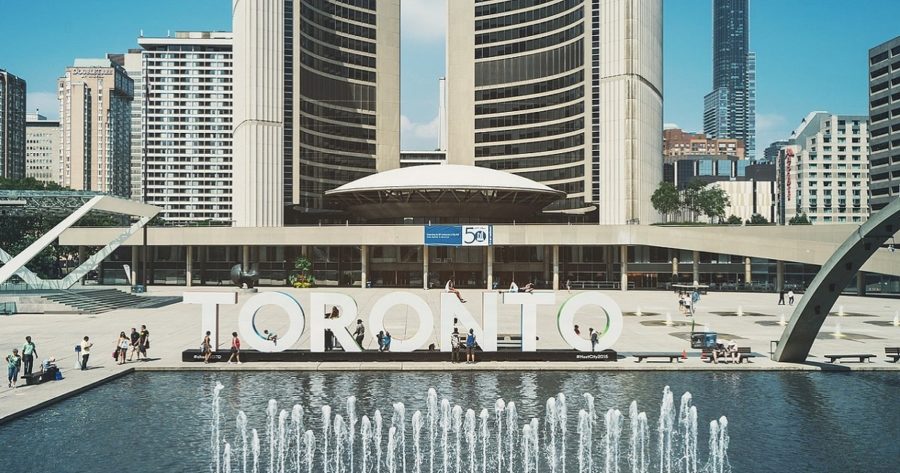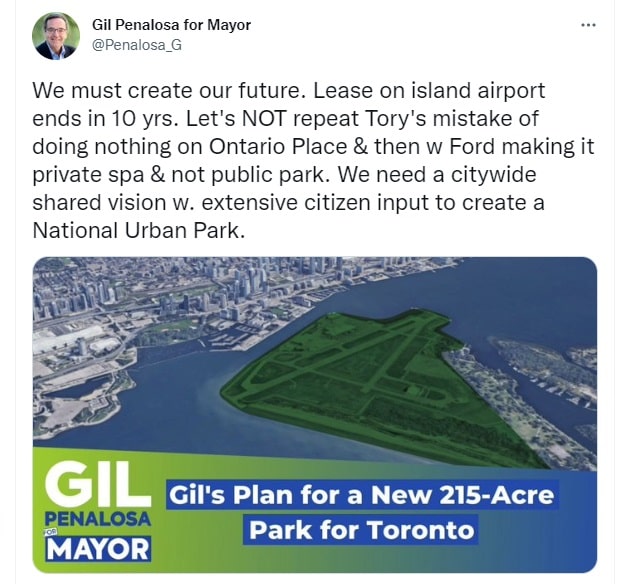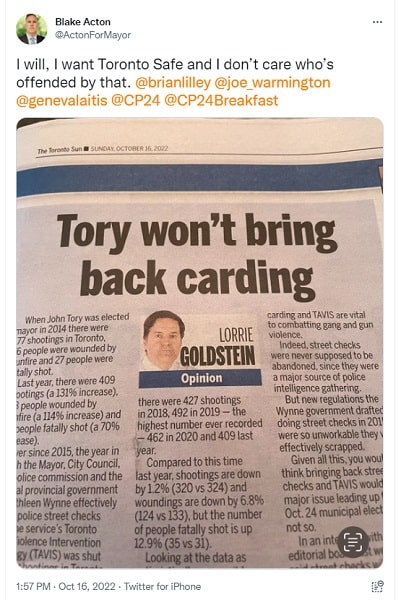John Tory’s 3rd Term Shouldn’t Have Been Inevitable, But It Was
- Nick Kossovan
- Eastern Canada
- Elections
- Trending
- October 26, 2022

This morning the sun rose in the east. The morning rush hour traffic on the DVP was stop-and-go. A homeless man who spent the night on a Bay Street grate got up and rolled up his sleeping bag to begin his day wandering the streets of Toronto. Somewhere in Etobicoke, a couple discussed their bills over breakfast.
Yesterday’s election results did not surprise Torontonians.
As the media had predicted, John Tory easily cruised into a third term. Tory received 62% (342,158 votes) of the vote. Second-place finisher Gil Penalosa received under 18% (98,525 votes). The media also predicted a low voter turnout; unfortunately, they were right. Only 29.2% of eligible voters voted in the mayoral race, well below the record low of 40.9% in 2018.
Apparently, 70% of Torontonians were not angry enough with John Tory to vote him out. It could also be argued that none of the mayoral candidates presented themselves as a compelling alternative to John Tory.
Better the devil you know than the devil you don’t is what gives incumbents their advantage. An additional advantage an incumbent has is that candidates challenging them fail to answer “Why?”
The “Why?” candidates seeking to become mayor of North America’s 4th largest city needed to answer were:

- Why does their leadership experience, if any, make them the best candidate and, more importantly, would make them a better mayor than John Tory?
- Why does their community involvement, if any, make them the best candidate and, more importantly, would make them a better mayor than John Tory?
Rather than answering these questions, candidates thought it made strategic sense to continuously bash John Tory. As well as attack politics, this election was dominated by identity politics and hot-button labelling due to candidates’ desperation for votes. Many so-called progressive candidates spent their entire campaign blaming John Tory for Toronto’s many “ills.”
Mayoral and council candidates would have fared better if they had spent less time attacking—a telltale sign they have nothing substantial to offer—and more time presenting how they would set the table for the people’s success.
It is commendable that John Tory ran a clean campaign. He never engaged in attack politics, entertained the taunts of the mayoral candidate, or got baited into debates knowing it would only result in a bash fest. Instead, he put his head down and focused on running his campaign. The Arabic proverb, “The dogs bark, but the caravan moves on,” comes to mind.
What makes many candidates believe that constantly attacking their opponent will give them credibility or political clout? The key to political success: Knowing the right people and being surrounded by the right team and supporters, not mudslinging.
Mayoral candidates grossly underestimate what it takes to be elected mayor of a city with a population of 6.3 million, which is larger than any province in Canada except Quebec. Running for mayor of Toronto is equivalent to running for a provincial premiership. Think about all that goes into becoming premier of, say, Alberta (pop. 4.5 million), British Columbia (pop. 5.2 million), or New Brunswick (pop. 794,300).
Becoming mayor of a city the size of Toronto requires a high level of ambition coupled with political moxie. I feel like candidates thought they could show up on the scene, make a few cliché promises that they would “fix things,” point fingers at who was to blame for “the mess,” and without any team, money, or name recognition, become Toronto’s next mayor.
Were mayoral candidates not aware they were facing off against John Tory’s well-oiled political machine?
Three issues were central to Toronto’s election:
- Crime
- Housing (affordability)
- Transit
Not of concern for most Torontonians:
- Free Wi-Fi on TTC.
- Able to drink alcohol in parks. (I have never had someone say, “How I wish I could drink in the parks! That would make all the difference for my lifestyle.”)
- More bike lanes.
- Reinstating city employees who were fired for refusing to get vaccinated against COVID.
Yes, these issues, and many others, matter to pockets of Torontonians. However, candidates needed to speak to all Torontonians to win votes; thus, they needed to craft their platform around issues that all Torontonians are concerned about. Candidates’ biggest mistake was speaking only to their bubble instead of speaking to all Torontonians.
Toronto mayoral candidates did not read the room.
As a result of not reading the room correctly, mayoral candidates made miscalculations that cost them votes, the most significant of which were:
- Would bring back carding by the police. (Blake Acton)
- Would get rid of vaccine mandates for City of Toronto employees. (Sarah Climenhaga)
- Proposed to replace Billy Bishop airport park. (Gil Penalosa)
Acton and Climenhaga opened cans of worms that most Torontonians would have preferred remained unopened. Penalosa created a new “What the hell!” by proposing Canada’s 10th busiest airport be turned into a 215-acre public park.
During his past two terms, John Tory kept property taxes at or below the rate of inflation, which he promised to continue doing (Why add to Toronto’s affordability issue.), and he attracted new business, thus creating jobs and economic opportunities. The meat and potatoes of winning elections are promising to keep taxes low and create jobs.
In several instances, Tory’s opponents made proposals that raised fears that property taxes might have to be increased to fulfill their promises. Explaining how you will pay for your election promises is basic Politics 101. Voters turn off candidates who create “taxes will have to be increased” fear.
Not voting = Not angry at John Tory or not wanting what the challenging candidates offer.
Torontonians who told me they would not be voting gave me two reasons:
- They were not angry enough with John Tory to vote him out of office.
- They were not motivated enough to want what any of the challenging candidates offered and were okay with letting Tory win a 3rd term. (READ: “I don’t believe any of the candidates would be better than John Tory.”).
The first reason is painted in logical poetry. The second reason also has logical poetry when equated to how people will stand in line for 10 – 20 minutes, sometimes longer, to get what is at the end of the line. Think of the lineups you see at Starbucks or Tim Hortons. People are in line because they want what’s being offered. People will find the time to line up for coffee, concert tickets, a job or whatever, as long as what is being offered is something they want.
Candidates are not owed media coverage.
Of course, the unelected candidates will have their excuses. Lack of media coverage will likely be the number one excuse. Media outlets, businesses that rely on advertising revenue and therefore must attract eyeballs, do not owe candidates coverage. Like all businesses, media outlets look after what’s in their best interest—to report news that is deemed newsworthy (READ: Will attract eyeballs.). Simply saying that if you are not Toronto’s next mayor, the city will implode does not make you newsworthy. In the same way, votes must be earned, media coverage must also be earned.
It is a candidate’s job, not the media’s, to get their message out to vote, to craft their message so it resonates, and to motivate voters to vote for them. In the age of social media, candidates no longer have to rely solely on “the media” to spread their message.
Another excuse will be not having name recognition. “It’s not fair, incumbents have name recognition!” Lack of community involvement is why a candidate does not have name recognition. Candidates had years prior to this election to become known in their community.
Insufficient money will be another excuse. Candidates who are visible, have a compelling platform and have cultivated relationships with the right people will attract donors. It is no secret that entering politics requires money, which is why candidates must present themselves, their platform, and their political ideology in such a way that donors will be drawn to them.
Some unsolicited advice for those considering running in 2026.

If you have even a slight itch to run for mayor or council in 2026, now is the time to begin positioning yourself as a serious contender. When running for mayor of a city with over 6 million residents—you are not running to be mayor of Englehart, Ontario (pop. 1,442)—you cannot be an unknown candidate. It takes years to prepare for a Toronto municipal election, whether to become mayor or sit on the city council.
You need to craft an image that makes Torontonians envision you as the mayor of Toronto. Establishing a robust social media presence will be even more crucial in four years as people continue to adopt social media to stay updated is essential. Start lining up the money (financial backers/donors) you know you will need.
Now is the time to start putting together a team (e.g., campaign manager, communication manager, social media manager, fundraising manager ) and developing relationships that will benefit your end goal of being elected. Attempting to become the mayor of Toronto or win a seat on city council by yourself is a foolhardy endeavour. Nobody has ever become the mayor of Toronto campaigning as a one-person show, which many candidates, in this election and previous, have tried to do.
Most importantly, don’t enter the 2026 Toronto election as an unknown. Be visible in your community. (You don’t need to be elected to make a difference in your community.)
Go into the 2026 Toronto election known, hungry and financially prepared, surrounded by a team. Use the next four years to learn how to market yourself and how to attract attention that gets news coverage (Make friends with the media.). Do all this and more, and you may have a chance of winning in 2026.
There are no shortcuts to Toronto’s city hall.
As someone who has travelled extensively throughout the world, I see Toronto for what it has become, a megacity that is no better or worse than any other major Western metropolis. (e.g., New York City, Los Angeles, London, Berlin, Vancouver) Name a city without crime, homelessness, and housing problems. Toronto is not immune to the social issues every metropolis faces.
I interpret yesterday’s election results as indicating that Torontonians believe that under Tory, Toronto is doing no better, no worse than other comparable cities. Better the devil you know than the devil you don’t. As for the 70% of eligible voters who did not vote, they were satisfied enough with Tory’s performance to remain apathetic, knowing he would be re-elected.
The inevitable happened because those challenging John Tory tried to play on angry Torontonians to look favourable; however, they misread the room.
______________________________________________________________
Nick Kossovan, a self-described connoisseur of human psychology, writes about what’s on his mind from Toronto. You can follow Nick on Twitter and Instagram @NKossovan








